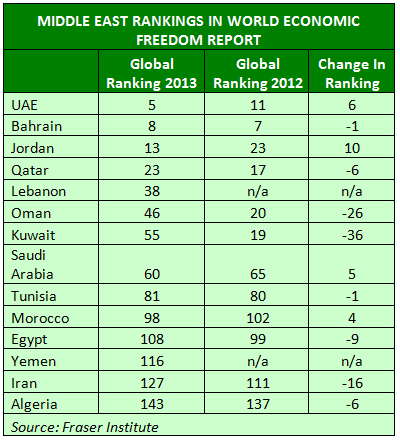Fraser names ‘most free’ economies in Mideast – alifarabia.com
22 September 2013 Five Middle East countries have been ranked among the world’s most free economies, according to Fraser Institute’s annual Economic Freedom of the World Survey.
The United Arab Emirates led the charge of the Middle East brigade, and was ranked fifth globally, after Hong Kong, Singapore, New Zealand and Switzerland.

Bahrain (ranked 8th), Jordan (13th), Qatar (23rd), and Lebanon (38th) were in the top quartile of the survey of 152 nations.
But most Middle East countries slipped from their rankings from last year.
The United Arab Emirates was one of the few bright spots in an otherwise gloomy view of Middle East economies. The country jumped six places from last year and beat Bahrain to become the region’s most free economy.Bahrain, which has been waylaid by demonstrations and internal strife, fell one place. That may not seem too bad, but Fraser ranked all countries based on data available in 2011 – the year when the Arab Spring began in earnest. So there is some scope for Bahrain to drop further down the rankings in subsequent years.
THE ARAB SPRING EFFECT
Overall, the Middle East states took a hit as the aftermath of the Arab Spring dented rankings of a number of regional countries.
Egypt fell nine places from last year’s survey to end up 108th in this year’s report. The country had been earning laurels in the past decade for its investor-friendly reforms and had fared well in a number of surveys including the World Bank’s Doing Business report.
But turmoil in the past few years has degraded the quality of governance and the administrative structures that run the economy.
“In recent decades, Egypt’s political institutions have been characterized by authoritarianism and extensive involvement of the military,” the survey said.
“It will be interesting to see how the recent turmoil from the election of the Muslim Brotherhood, the contested adoption of a constitution, and the military intervention that followed will affect the future of Egypt.”
Tunisia slipped only one place despite massive upheavals in the aftermath of the Arab Spring. Tunisia was Ground Zero of the Arab Spring, but has made progress in electing a new government, even though there are serious divisions among Tunisians on whether the country should pursue a secular or a religious path.
Although Algerians largely shunned the Arab Spring movement, the country still slipped six places from its already unimpressive rank of 137thto 143rd in this year’s survey.
“Government enterprise and investment accounts for 61.3% of total investment in Algeria, indicating that the private sector is substantially crowded out. Algeria has significant controls on capital markets, labor markets, and business with no rating above 5.0 for these subsections.”
MIXED PERFORMANCE IN GCC
Gulf States saw their rankings fluctuate massively this year. While the UAE and Saudi Arabia improved their ranking compared to last year, Kuwait, Qatar, Oman and Bahrain slipped.
Kuwait fared the worst, falling 36 places, to finish at 55th – a far cry from its impressive 19th place in last year’s survey.
The country performed especially poorly in money management and credit market regulations – which is an indicator of the troubles the country’s financial and investment sector faced in the aftermath of the global financial crisis.
Oman also slipped 26 places, even though it managed to pacify an Arab Spring movement brewing in the country in 2011 with a string of incentives and measures.
But the sultanate’s position suffered as the new measures included government jobs, which increased the size of government spending. The Fraser Institute has also taken a dim view of the rapid increase in the size of government, which would inflate its wage bill, leaving a lot less for capital investment and private sector growth.
HONG KONG BEATS AUSTRALIA
The Fraser rankings some time appears to be at odds with popular perceptions.
Autocratic places like Singapore, Hong Kong and the UAE, have been ranked far higher than countries like Australia and the United States — which are seen as bastions of freedom and liberty.
The institute says the cornerstones of economic freedom are personal choice, voluntary exchange coordinated by markets, freedom to enter and compete in markets, and protection of persons and their “property from aggression by others.”
“In order to receive a high EFW [Economic Freedom Of the World] rating, a country must provide secure protection of privately owned property, even-handed enforcement of contracts, and a stable monetary environment,” the institute clarified.
“It also must keep taxes low, refrain from creating barriers to both domestic and international trade, and rely more fully on markets rather than government spending and regulation to allocate goods and resources.”
Clearly, Fraser Institute makes the strong connection between economic freedom and standard of living.
Nations in the top quartile of economic freedom had an average per-capita GDP of USD 36,446, compared to USD 4,382 for nations in the bottom quartile.
Average income of the poorest 10% in the top quartile was USD 10,556 compared to USD 932 in the bottom quartile.
“Interestingly, the average income of the poorest 10% in the most economically free nations is more than twice the overall average income in the least free nations,” the institute said.
© alifarabia.com 2013







